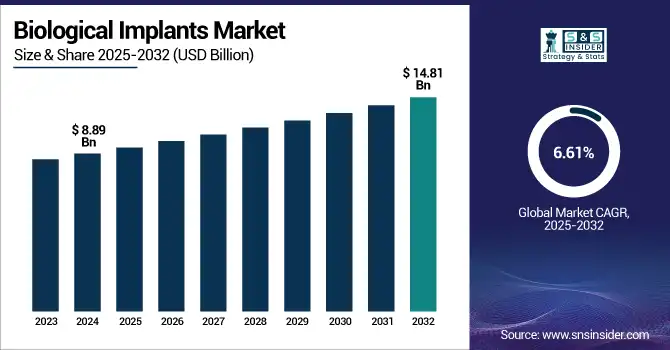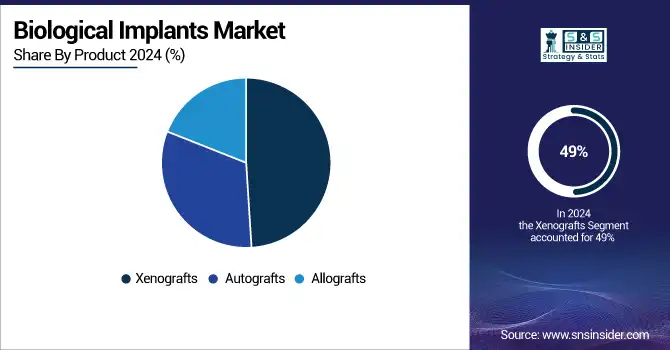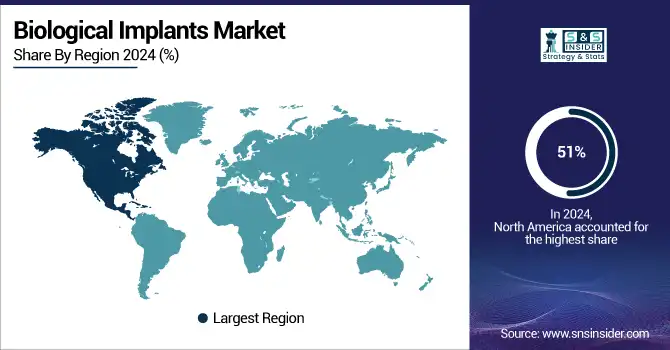Biological Implants Market Size & Trends
The Biological Implants Market size was valued at USD 8.89 billion in 2024 and is expected to reach USD 14.81 billion by 2032, growing at a CAGR of 6.61% over the forecast period of 2025-2032.

To Get more information on Biological Implants Market - Request Free Sample Report
The biological implants market is undergoing a transformative phase, fueled by a convergence of demographic, clinical, and technological drivers. The rising global burden of chronic diseases, especially cardiovascular, orthopedic, and dental conditions, with an aging population that progressively needs improved medical interventions, is a main driver of the rise of this industry.
For instance, the World Health Organization (WHO) estimates that 32% of all global deaths each year are related to cardiovascular disorders, which emphasizes the critical necessity of innovative cardiovascular biological implants.
The U.S. government organizations, including the Centers for Disease Control and Prevention (CDC) allocated over USD 300 million in 2023 for heart disease and stroke prevention directly supporting the acceptance of soft tissue implants and regeneration biological materials. Furthermore, stressing the need for bio-implants for bone restoration and other biologic grafts, the Australian Institute of Health and Welfare recorded 7,691 deaths from chronic obstructive pulmonary disease (COPD) in 2022.
With a 6.51% CAGR throughout the forecast period, the U.S. biological implants market size is expected to reach USD 6.37 billion by 2032 from USD 3.85 billion in 2024. The country’s advanced healthcare system, strong government expenditure, and fast acceptance of innovative technology in biocompatible implant materials, tissue engineering, and minimally invasive operations contribute to this dominance. Reflecting the country's dedication to help the most recent developments in surgical implant biomaterials and bioresorbable implants, the Centers for Medicare & Medicaid Services (CMS) revealed the U.S. health expenditures of USD 4.1 trillion in 2020. Artificial intelligence (AI), 3D printing, and next-generation extracellular matrix (ECM) scaffolds together are accelerating the market’s trajectory, making the U.S. a global leader in both innovation and implementation.
Biological Implants Market Dynamics
Drivers:
-
Rising Geriatric Population and Chronic Disease Burden Accelerate Biological Implant Adoption
The rapidly increasing global elderly population combined with the growing frequency of chronic diseases, is greatly increasing the adoption of biological implants all around.
The World Health Organisation (WHO) estimates, the number of people aging 60 years and above would reach 1.4 billion by 2030, nearly doubling from 2020.
Older adults are disproportionately impacted by degenerative diseases, such as osteoarthritis, cardiovascular diseases, and diabetes, all of which often call for surgical interventions involving biological implants, hence, this demographic change is noteworthy.
Globally, chronic diseases rank first in both morbidity and death rates. For instance, the WHO estimates, annually, cardiovascular diseases account for 32% of global deaths. Another main cause is osteoarthritis, which affects over 528 million people globally and leads to joint degeneration, often needing hip, knee, or spinal implants. The Centers for Disease Control and Prevention (CDC) states that in the U.S. alone, around 54 million individuals struggle with arthritis, with numbers projected to climb as the population ages.
The growing burden of these diseases has driven higher healthcare costs and more focus on long-lasting, minimally invasive treatments. Compared to synthetic substitutes, biological implants created from biocompatible materials, such as collagen, bone, or tissue-engineered products offer better integration with the human body and lower risk of rejection. This makes them particularly attractive for elderly patients who may have compromised immune systems or multiple comorbidities.
Restraints:
-
Post-Operative Risks and Regulatory Complexity Delay Market Expansion and Patient Trust
Strict approval procedures of 7–10 years for new implants, combined with a 12% annual increase in FDA recall rates since 2020, impede market expansion. Recent recalls of metal-on-metal hip implants and pacemaker cybersecurity flaws have undermined patient confidence and 34% of the U.S. adults have expressed uncertainty about implant safety. Biocompatibility issues still exist since 15% of polymer-based implants cause immunological responses that call for revision surgeries costing 2.3× initial procedures. Although the 2023 ISO 13485 updates aim to standardize quality management, scattered worldwide rules and liability concerns continue to deter SMEs from entering high-need niches, including pediatric implants. Reducing these risks and rebuilding stakeholder confidence will depend mostly on improved post-market surveillance and AI-driven predictive analytics.
Biological Implants Market Segmentation Overview
By Product
The xenografts segment dominated the biological implants market share of 49% in 2024. The growth is driven by their fast availability and developments in biocompatible implant materials, xenografts, biological implants generated from animal origins, are becoming more and more popular. These implants are particularly common in soft tissue, dental, and cardiovascular biological implants, where the scarcity of human donor tissues and organs presents a major obstacle.
Xenografts, that closely mimic human tissue have been made possible by technological advancement in tissue engineering, along with the reduction of immunological rejection and enhancement of patient outcomes. For instance, the June 2024 update on phthalates in medical equipment by the European Commission guarantees better and safer collagen-based implants and ECM scaffolds. In line with the global standards and to improve patient safety, Health Canada's July 2024 update on Good Manufacturing Practices for biologics improves the monitoring of regenerative biological materials and biologic grafts even more.
Over the next projection period, the allografts sector of the biological implants market is expected to expand with the fastest CAGR due to the advances in tissue banking, sterilization, and donor matching. Allografts from human donors are progressively preferred for bio-implants for bone restoration, biologic grafts, and orthopedic biological implants. Leading biological implants companies have lately introduced products that increase the spectrum of allograft options. Launched in June 2022, ZimVie's T3 PRO Tapered Implant and Encode Emergence Healing Abutment, FDA-approved devices that improve the capacity of dental biological implants and soft tissue implants. The fast expansion of the allografts market is being facilitated by these technological and regulatory developments.

By Application
The soft tissue implants segment led the biological implants market in 2024 owing to the rising global incidence of injuries, reconstructive surgeries, and cosmetic procedures. A preferred alternative for both patients and doctors since innovations in biocompatible implant materials and tissue engineering have enhanced the safety, efficacy, and lifetime of soft tissue implants. Active supporters of this tendency are regulatory authorities. Further biologics in orthopedics and soft tissue repair have been made possible by the U.S. FDA's De Novo categorization of smart orthopedic implants, such as Zimmer Biomet's Persona IQ (2021).
Cardiovascular biological implants are expected to have the fastest CAGR in the biological implants market, driven by the global burden of cardiovascular illnesses and growing acceptance of minimally invasive operations. Advanced cardiovascular biological implants, bioresorbable implants, and ECM scaffolds are needed, based on the CDC's continuous investment in heart disease prevention and WHO statistics on cardiovascular mortality. While the EMA's revised safety rules guarantee the highest standards for patients that need bio-implants for bone reconstruction and soft tissue repair, the FDA's 2024 guidance on accelerated sterilization for Class III devices maintains a steady supply of these life-saving devices.
By Mode of Administration
The surgical segment held 56% of the biological implants market share in 2024, and is expected to grow at the fastest CAGR over the forecast period. Rising numbers of surgical procedures for orthopedic biological implants, cardiovascular biological implants, and dental biological implants, and the demonstrated efficacy of surgical implant biomaterials in challenging situations, promote this predominance. Advances in minimally invasive procedures, robotic-assisted techniques, and biocompatible implant materials have improved patient outcomes and lowered recovery periods, making surgical implantation the preferred mode of administration.
The U.S. FDA's 2024 recommendations on sterilization site alterations guarantee continuous access to important surgical implant biomaterials, therefore supporting the expansion of the surgical market. For instance, in September 2024, the Therapeutic Goods Administration (TGA) amended GMP criteria for therapeutic goods in Australia, therefore strengthening standards for surgical implant biomaterials and regenerative biological materials. Maintaining the quality and safety of bio-implants for soft tissue repair and bone restoration that depends on these regular regulatory upgrades.
Biological Implants Market Regional Analysis
North America, led by the U.S., dominated the global biological implants market in 2024, and held 51% market share. Advanced healthcare infrastructure, great government healthcare expenditure, and rapid acceptance of novel technology in soft tissue implants, cardiovascular biological implants, and orthopedic biological implants help to explain this supremacy. Reflecting strong investment in biocompatible implant materials, tissue engineering, and regenerative biological materials, the CMS noted, the U.S. health expenditures of USD 4.1 trillion. The presence of major biological implant companies, such as Stryker, Medtronic, and Johnson & Johnson adds even more evidence of the region's supremacy.
For instance, the Centers for Disease Control and Prevention estimates that 1 in 20 people aged 20 and above in the U.S. have coronary artery disease, which fuels notable demand for soft tissue, orthopedic, and cardiovascular biological implants.
The Asia Pacific region is projected to experience the fastest biological implants market growth with a CAGR of 7.34%, driven by the rising healthcare spending, growing incidence of chronic diseases, and improved healthcare infrastructure. Supported by government projects and increased access to minimally invasive operations, bioresorbable implants, and regenerative biological materials, China, Australia, and India are spearheading this rise. Comprising more than 65,000 members, the Asia Pacific Orthopaedic Association is actively advocating biologics in orthopedics and sophisticated surgical procedures. With 29.6 fatalities per 100,000 persons in Australia in 2022 from chronic obstructive pulmonary disease (COPD), implants will become even more important in helping to control degenerative diseases.
Europe holds a significant share in the global biological implants market, driven by an aging population, which is over 21% of the EU’s 448.8 million residents were aged 65 or older in 2023, and a high incidence of degenerative and chronic diseases, such as osteoporosis and cardiovascular conditions. The region benefits from stringent regulatory standards established by the European Medicines Agency (EMA), which ensure the safety and efficacy of bio-implants, including biological mesh implants, collagen-based implants, and extracellular matrix (ECM) scaffolds. The demand for minimally invasive procedures is particularly high, supported by innovations in surgical implant biomaterials and favorable reimbursement policies. Countries, such as Germany, France, and the U.K. are at the forefront of adopting advanced cardiovascular biological implants, soft tissue implants, and dental biological implants.

Get Customized Report as per Your Business Requirement - Enquiry Now
Biological Implants Market Companies
The key biological implants companies are Maxigen Biotech Inc., NuVasive, Inc., Stryker, LifeCell International Pvt. Ltd., Medtronic, CONMED Corporation, RTI Surgical, AbbVie Inc., BioPolymer GmbH & Co KG, Edwards Lifesciences Corporation, Johnson & Johnson Private Limited, Baxter, ATEC Spine, Inc, Artivion, Inc., Implandata Ophthalmic Products GmbH, BioTissue, Osteotec Limited, Vericel, and others.
Recent Developments in Biological Implants Industry
-
Arthrex received FDA approval for its TightRope implant for pediatric uses in January 2023. First and only fixation device for anterior cruciate ligament (ACL) injuries certified for pediatric use, this implant is utilized in surgical treatment of orthopedic injuries. This enabled the business to increase the range of products it offers and appeal to more customers.
-
Health Canada revised its good manufacturing practices for biologics in July 2024 in line with international standards to improve control of biologic grafts and regenerative biological materials.
| Report Attributes | Details |
|---|---|
| Market Size in 2024 | USD 8.89 Billion |
| Market Size by 2032 | USD 14.81 Billion |
| CAGR | CAGR of 6.61% From 2025 to 2032 |
| Base Year | 2024 |
| Forecast Period | 2025-2032 |
| Historical Data | 2021-2023 |
| Report Scope & Coverage | Market Size, Segments Analysis, Competitive Landscape, Regional Analysis, DROC & SWOT Analysis, Forecast Outlook |
| Key Segments | • By Product (Xenografts, Autografts, Allografts) • By Mode of Administration (Injectable, Surgical) • By Application (Orthopedic Implants, Cardiovascular Implants, Other Soft Tissue Implants) |
| Regional Analysis/Coverage | North America (US, Canada, Mexico), Europe (Germany, France, UK, Italy, Spain, Poland, Turkey, Rest of Europe), Asia Pacific (China, India, Japan, South Korea, Singapore, Australia, Rest of Asia Pacific), Middle East & Africa (UAE, Saudi Arabia, Qatar, South Africa, Rest of Middle East & Africa), Latin America (Brazil, Argentina, Rest of Latin America) |
| Company Profiles | Maxigen Biotech Inc., NuVasive, Inc., Stryker, LifeCell International Pvt. Ltd., Medtronic, CONMED Corporation, RTI Surgical, AbbVie Inc., BioPolymer GmbH & Co KG, Edwards Lifesciences Corporation, Johnson & Johnson Private Limited, Baxter, ATEC Spine, Inc, Artivion, Inc., Implandata Ophthalmic Products GmbH, BioTissue, Osteotec Limited, Vericel, and others |

